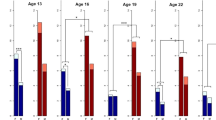Abstract
Perceptions of behavioral deviations from sex roles were examined in light of past research on attributions for in-role and out-of-role behavior. Male and female high school students read descriptions of in-role or out-of-role males and females and described the personality of the actor on a series of bipolar scales. As expected, subjects made corresponding inferences from the actor's behavior to his/her disposition as a consequence of out-of-role, not in-role, behavior. However, this predicted effect appeared only when subjects were making attributions toward a member of their own sex. Possible factors involved in this attributional process are considered.
Similar content being viewed by others
References
Bond-Dunn, L. A., Deming, S., & Goodman, J. The development of attributions concerning male and female performance on sex stereotypic tasks. Paper presented at the Eastern Psychological Association Convention, Washington, DC., April 1978.
Broverman, I. K., Broverman, D. M., Clarkson, F. E., Rosenkrantz, P. S., & Vogel, S. R. Sex-role stereotypes and clinical judgments of mental health. Journal of Consulting and Clinical Psychology. 1970, 34(1), 1–7.
Deaux, K., & Emswiller, T. Explanations of successful performance on sex-linked tasks: What is skill for the male is luck for the female. Journal of Personality and Social Psychology, 1974, 29, 80–85.
Deaux, K., & Taynor, J. Evaluation of male and female ability: Bias works two ways. Psychological Reports, 1973, 32(1), 261–262.
Etaugh, C., & Brown, B. Perceiving the causes of success and failure of male and female performers. Developmental Psychology, 1975, 11, 103.
Feldman-Summers, S. A., & Kiesler, S. B. Those who are number two try harder: The effects of sex on attributions of causality. Journal of Personality and Social Psychology, 1974, 30, 846–855.
Heider, F. The psychology of interpersonal relations. New York: Wiley, 1958.
Jones, E. E., & Davis, K. E. From acts to dispositions: The attribution process in person perception. In L. Berkowitz (Ed.), Advances in experimental social psychology. New York: Academic Press, 1965.
Jones, E. E., Davis, K. E., & Gergen, K. J. Role playing variations and their informational value for person perception. Journal of Abnormal and Social Psychology, 1961, 63, 302–310.
Katz, S., & Burnstein, E. Is an out-of-role act credible to biased observers and does it affect the credibility of neutral acts? Unpublished manuscript, University of Michigan, 1974.
Kelley, H. Attribution theory in social psychology. In D. Levine (Ed.), Nebraska symposium on motivation. Lincoln: University of Nebraska Press, 1967.
Kelley, H. H. Attribution in social interaction. New York: General Learning Press, 1971.
Osgood, C. E., & Tannenbaum, P. H. The principle of congruity in the prediction of attitude change. Psychological Review, 1955, 62, 42–55.
Rosenkrantz, P., Vogel, S., Bee, H., Broverman, I., and Broverman, D. Sex-role stereotypes and self-concepts in college students. Journal of Consulting and Clinical Psychology, 1968, 32(3), 287–295.
Stein, A. H., Pohly, S. R., & Mueller, E. The influence of masculine, feminine, and neutral tasks on children's achievement behavior, expectancies of success, and attainment values. Child Development, 1971, 42, 195–207.
Weiner, B., Frieze, I., Kukla, A., Reed, L., Rest, S., & Rosenbaum, R. M. Perceiving the causes of success and failure. New York: General Learning Press, 1971.
Author information
Authors and Affiliations
Additional information
Collection of the preliminary data for this study was supported in part by an NIMH Training Grant (2 TO1 MH 12672) to the Department of Psychology, Tufts University.
Rights and permissions
About this article
Cite this article
Bond, L.A. Perceptions of sex-role deviations: An attributional analysis. Sex Roles 7, 107–115 (1981). https://doi.org/10.1007/BF00287797
Issue Date:
DOI: https://doi.org/10.1007/BF00287797




